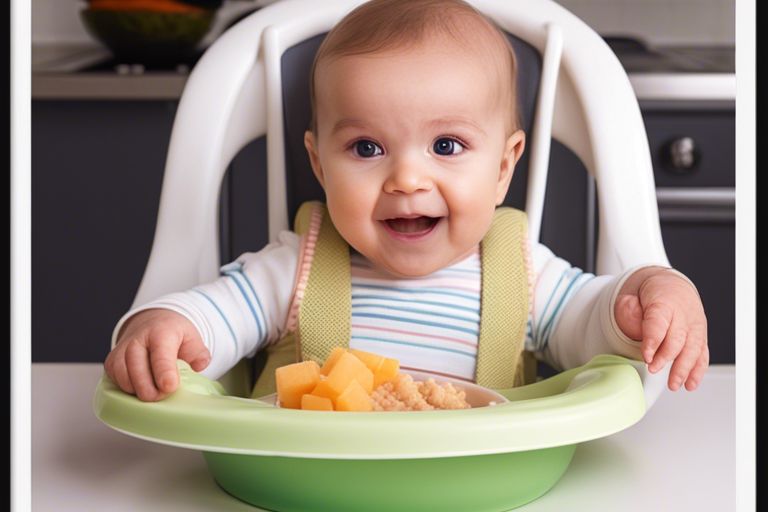tips, tricks and guides for parenthood
Overwhelmed by the plethora of options for your baby's first solid foods? Choosing the safest starter solids is crucial to your little one's health and development. From avoiding common allergens like nuts and eggs to opting for gentle fruits and vegetables, there are key points to consider when introducing solids. Steering clear of honey and ensuring foods are cooked thoroughly are also vital steps. Stay tuned to learn more about the safest and most nutritious options for your baby's exciting journey into the world of solid foods!
On understanding the nutritional needs of babies, it is important to focus on providing vital nutrients such as iron, zinc, calcium, and vitamin D. These nutrients are crucial for the healthy growth and development of your little one.
Needs to be mindful of potential allergenic foods such as peanuts, eggs, and dairy products when introducing solids to your baby. It is crucial to introduce these foods one at a time and monitor for any signs of allergies. Consult with a healthcare professional if you have a family history of food allergies to determine the best approach for your baby.
One of the most crucial aspects of introducing solid foods to your baby is knowing when to start. The general recommendation is to begin between four and six months old, when your little one shows signs of readiness such as sitting up with minimal support and showing interest in what you are eating.
Foods that are safe and easy for babies to digest are ideal choices for their first solid foods. For instance, pureed fruits like banana and pear are gentle on your baby's stomach and packed with crucial nutrients. Vegetables such as sweet potato and avocado are also great options as they are easy to mash up and are rich in vitamins and minerals that aid in your baby's growth and development.
Unlike Feeding Your 4- to 7-Month-Old (for Parents), preparing your baby's first solid meal is a significant milestone. It's crucial to ensure that the food you introduce is safe, nutritious, and easy for your little one to digest.
On the journey of introducing solids to your baby, maintaining kitchen hygiene is crucial. Wash your hands thoroughly before handling any food items, and sanitise all utensils and surfaces that will come into contact with the baby's food. Avoid cross-contamination by storing raw and cooked foods separately.
Preparing easy-to-digest baby foods is key for your baby's smooth transition to solid foods. Start with simple, single-ingredient purees such as apple sauce or mashed banana. These foods are gentle on your baby's developing digestive system and help them get used to new textures.
Hygiene in food preparation and serving is crucial to prevent foodborne illnesses. Ensure that all fruits and vegetables are thoroughly washed and peeled before cooking. Avoid adding any salt, sugar, or seasonings to your baby's food as their taste buds are still developing.

Not all babies are ready for the same textures and flavours at the same time. It's important to introduce a variety of textures and flavours gradually, starting with softer textures and mild flavours before moving on to chunkier textures and stronger tastes. This helps babies adjust and develop their palate, preparing them for a wider range of foods as they grow.
On the journey of transitioning your baby to family foods, it's necessary to take it slow and pay attention to their reactions. Start by offering small amounts of mashed family foods that are easy to digest and incorporate a mix of food groups. Gradually increase the quantity and diversity of foods offered as your baby gets accustomed to different tastes and textures.
For instance, be cautious when introducing common allergens such as nuts, eggs, and shellfish. Monitor your baby for any signs of allergy after introducing a new food. Consult with a healthcare professional if you have any concerns about potential allergens.
Choosing the safest starter solids for your baby is vital in ensuring their well-being and development. By following the guidelines and recommendations provided, such as opting for single-ingredient foods, starting with iron-rich options, and gradually introducing new foods, you can create a positive and healthy experience for your little one. Remember to consult with your healthcare provider for personalised advice and enjoy this exciting journey of exploring new tastes and textures with your baby!
A: It is crucial to choose safe starter solids for babies to ensure they receive the right nutrients and to prevent any potential health risks.
A: Start with single-ingredient, easily digestible foods like pureed fruits, vegetables, and iron-fortified cereals recommended for babies.
A: It is generally recommended to introduce solid foods to your baby around 6 months of age, when they start showing signs of readiness.
A: Common allergenic foods include eggs, dairy, peanuts, tree nuts, wheat, soy, fish, and shellfish. Introduce these foods one at a time and observe for any reactions.
A: Always wash and prepare foods properly, avoid choking hazards like whole nuts or chunks of food, and consult with a healthcare provider for guidance on suitable starter solids for your baby.